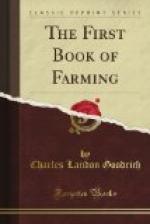=Carbohydrate=, an organic substance made of oxygen, hydrogen and carbon, but containing no nitrogen; cellulose or woody fibre, sugar, starch are examples.
=Carbon=, a chemical element. Charcoal is nearly pure carbon.
=Carbonic acid gas=, a gas consisting of carbon and oxygen. It is produced from the lungs of animals, and by the decay or burning of organic matter.
=Catch crop=, a crop growing during the interval between regular crops.
=Cereal=, a name given to the grain crops that are used for food.
=Chlorophyl=, the green matter in plants.
=Commercial fertilizers=, materials containing plant food which are bought and sold in the markets to improve the soil.
=Compost=, a mixture of decaying organic matter used to enrich the soil.
=Cross pollination=, the pollination of a flower by pollen brought from some other flower.
=Cover crop=, a crop to cover the soil during the interval between regular corps.
=Cultivator=, a farm implement used to loosen the surface of the soil and to kill weeds after a crop has been planted.
=Cutting=, a part of a plant placed in moist soil, water or other medium with the object of its producing roots and making a new plant.
=Dormant=, said of plants when they are resting or inactive. Most plants are dormant during the winter season.
=Drainage=, the method by which surplus water is removed from the land.
=Element=, a substance that cannot be divided into simpler substances.
=Fermentation=, the process by which organic substances are broken down or changed and new substances formed.
=Fertility=, that state or condition of the soil which enables it to produce crops.
=Fibre=, long thread-like structure.
=Flocculate=, to make crumbly.
=Free water=, standing water or water which flows under the influence of gravity.
=Function=, the particular action of any part of an organism.
=Furrow=, the trench left by the plow.
=Furrow slice=, the strip of earth which is turned by the plow.
=Germinate=, to sprout.
=Grafting=, the process of inserting a cion or bud in a stock plant.
=Green manure crops=, crops intended to be plowed under to improve the soil.
=Harrow=, an implement used to pulverize the surface of the soil.
=Heavy soils=, soils that are hard to work; stiff, cloddy soils.
=Horticulture=, that branch of agriculture which deals with the growing of fruits, vegetables, flowers and ornamental plants.
=Humus=, partially decayed animal and vegetable matter in the soil.
=Hydrogen=, a gaseous, chemical element, one of the constituents of water.
=Inter-tillage=, tillage between plants.
=Irrigation=, the practice of supplying plants with water by artificial means.




